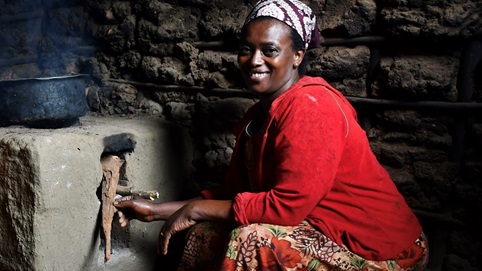For enterprises, organisations and individuals the reduction of their Carbon Footprint is an important step to more sustainability and on the way to climate neutrality. But in most cases, CO2 emissions cannot be entirely avoided.
By investing in carbon credits you help to fight climate change and to improve the living conditions of people in the project areas for example by increasing living standards, allowing access to education, creating jobs, improving health conditions or infrastructure and further more.
Climate protection is a global issue. For the climate, it is not relevant in which parts of the world climate-relevant emissions are released.
The implementation of emission-reducing measures as part of international climate projects is an essential and absolutely necessary contribution to achieving climate protection targets.
We only recommend projects that are certified according to internationally recognized standards, such as the GOLD STANDARD created by the WWF or the VCS (Verified Carbon Standard).
To ensure the necessary quality and transparency, these projects are registered in publicly accessible registers. The project is continuously monitored over the entire duration of the project and the carbon credits generated each year are certified.
Each carbon credit - equivalent to the saving of one ton of CO2 - is assigned a unique identification number in the register. When credits are purchased, they are retired in the register. This prevents multiple use.

We recommend - as required by PAS 2060 - that contribution shoult be made to projects that meet the following criteria:
More information on our projects you find on Climate Projects.
We will be happy to assists you in reducing your carbon footprint and in choosing projects eligible to your business.
Due to increased enquiries regarding CO2 offsetting via projects within the EU (e.g. forest protection, reforestation, etc.), we take the liberty of referring to the relevant information provided by the German Emissions Trading Authority of the German Federal Environment Agency. Excerpts from this information page: "..If a domestic climate protection project achieves emission reductions – e.g. in forests or peatlands – this takes place on an area that is reported in the German greenhouse gas inventory and thus counted towards meeting emission reduction targets target. If these carbon sequestration were now to be used by a private individual to offset their own emissions and justify climate neutrality, this emission reduction would be double counted without the national ambition level having been increased. Double counting is still the case if the climate protection measure takes place on land owned by the stakeholder since the emission reduction or carbon sequestration achieved on that land is reported in the German greenhouse gas inventory regardless of land ownership. This double counting problem makes offsetting in Germany very complex. ‘Corresponding adjustments’ could also be shown in the German balance sheet to prevent double counting, or extra projects, project or sector areas could be set aside for use within the framework of a voluntary offsetting approach. However, no corresponding mechanisms have yet been envisaged for Germany (or the EU) that would allow domestic or intra-European reductions to be released to the voluntary market and removed from the national inventory. Due to the holistic German climate protection strategy across all sectors, there are also no possibilities to implement projects outside of the German NDC and use them for voluntary offsetting."
" ....there is an alternative. Both national and international climate protection projects within and outside an NDC, can still be supported financially – without any risk of double counting. The alternative is to use the credits in a different way and communicate this correspondingly. The reduction result can be better identified and communicated as a contribution to the host country's emission reduction target instead of striving for a neutral position. This communication emphasises the climate protection contribution made as a joint effort to the emission reduction target (‘contribution claim’). For example, statements such as ‘Together we are helping Germany to achieve climate protection contribution’ or ‘On the way to mutual climate neutrality’ can be made. Instead of emphasising their own separate neutrality, a company or public administration may declare that they have made a financial contribution to the project country’s emission reduction target amounting to the emissions to be offset."
Contact: claudia.rosmanith@eecaustria.at
